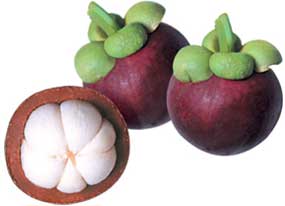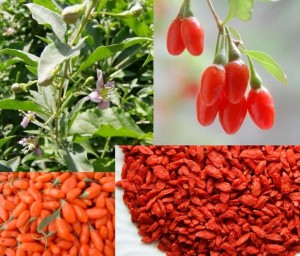It seems that each week we are introduced to a new Super Food that promises to protect us from any ailment, ache or pain all the while adding years to our life. While many of these Super Foods are familiar to us like blueberries and green tea, there is a whole category that come from distant tropical lands and sport funny names, textures and tastes.
Three new recently-lauded Super Foods are Goji berries, Mangosteen and Noni. Here is a quick look at all three of these and how they compare to the common, but equally powerful, Vitamin C-packed orange.
Gogi berries: These bite-sized reddish berries are somewhat like a raisin in appearance and texture: small, wrinkled and chewy. Gogi berries come from China and Tibet where they have been used for thousands of years to improve eye sight, promote liver function and add to overall health and longevity. Folklore has it that a Chinese man named Li Qing Yuen consumed goji berries daily and lived to be 252 years old (a rather undocumented claim).
Gogi berries are rich in antioxidants, particularly the antioxidants, beta-carotene and zeaxanthin that protect your eye’s retina. Cancer research has produced some small but positive results on cancer patients response to their chemotherapy treatment.
They can now be found almost anywhere: in trail mixes, cereals and juices but you won’t find gogi berries fresh. One-quarter cup has about 90 calories, 4 grams of fiber, 4 grams of fat, 15 % of your recommended intake of iron and 180% of your recommended daily intake of Vitamin A.
Mangosteen: This tropical fruit bears no similarity or relation to the mango, another tropical darling. Mangosteen has been praised because of its anti-inflammatory effects and its impressive antioxidant content which may help to reduce the risk of certain diseases. Mangosteen juices can be readily found at health food stores but don’t look for the fresh form since they are not allowed in the continental US because of their tranport potential for carrying insects into the country.
Noni: Noni is a Tahitian fruit but unlike these other Super Fruits, noni is not very palatable. It has a strong odor and bitter taste and is really only consumed during times of famine or starvation. But it does boast an impressive profile of phytochemicals, niacin, iron, potassium and calcium.
Here in the West, Noni is consumed in a juice form where it is mixed with other fruit juices to offset its pungent flavor. But noni juice has recently come under investigation for potential toxicity effects. In addition, because of its high electrolyte content, those with kidney disease should avoid taking it.
These Super Foods have food manufacturers feverishly producing products that promise to deliver you magical results in a bottle. And with a hefty price tag (some bottles of mangosteen juice, for instance, can set you back $50). If the health claims on the container of your noni juice seem a bit outlandish, they probably are. Many nutrition experts criticize these new products for being nothing more than simply very expensive fruit juices. So before deciding to test one out, do your homework, watch your wallet and don’t expect to live to 252 years of age like our dear friend, Li Qing Yuen. Gogi berries, mangosteen, et al. are without question very nutritious but the same nutrients can be found in your glass of orange juice or your afternoon cup of green tea.


